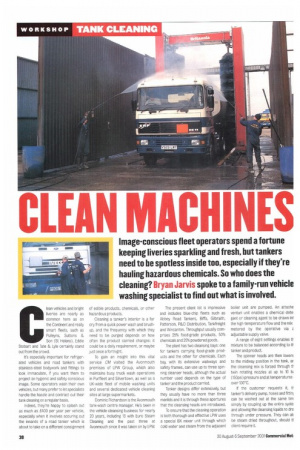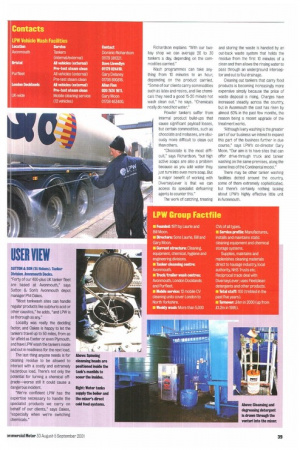CLEAN AC NES
Page 38

Page 39

If you've noticed an error in this article please click here to report it so we can fix it.
Image-conscious fleet operators spend a fortune keeping liveries sparkling and fresh, but tankers need to be spotless inside too, especially if they're hauling hazardous chemicals. So who does the cleaning? Bryan Jarvis spoke to a family-run vehicle washing specialist to find out what is involved.
Clean vehicles and bright liveries are nearly as common here as on the Continent and really smart fleets, such as Pulleyns, Suttons & Son (St Helens), Eddie Stobart and Tate & Lyle certainly stand out from the crowd.
It's especially important for refrigerated vehicles and road tankers with stainless-steel bodywork and fittings to look immaculate, if you want them to project an hygienic and safety conscious image. Some operators wash their own vehicles, but many prefer to let specialists handle the hassle and contract out their tank cleaning on a regular basis.
Indeed, they're happy to splash out as much as £400 per year per vehicle, especially when it involves scouring out the innards of a road tanker which is about to take on a different consignment of edible products, chemicals, or other hazardous products.
Cleaning a tanker's interior is a far cry from a quick power wash and brushup, and the frequency with which they need to be purged depends on how often the product carried changes: it could be a daily requirement, or maybe just once a fortnight.
To gain an insight into this vital service CM visited the Avonmouth premises of LPW Group, which also maintains busy truck wash operations in Purfleet and Silvertown, as well as a UK-wide fleet of mobile washing units and several dedicated vehicle cleaning sites at large supermarkets.
Dominic Richardson is the Avonmouth tank-wash centre manager. He's been in the vehicle cleansing business for nearly 20 years. including 13 with Euro Steam Cleaning and the past three at Avonmouth since it was taken on by LPW. The present client list is impressive and includes blue-chip fleets such as Abbey Road Tankers, Ma, Gilbraith, Patterson, P&O Distribution, Tankfreight and Wincanton. Throughput usually comprises 25% food-grade products, 50% chemicals and 25% powdered goods.
The plant has two cleansing bays: one for tankers carrying food-grade products and the other for chemicals. Each bay, with its extensive walkways and safety frames, can use up to three spinning cleanser heads, although the actual number used depends on the type of tanker and the product carried.
Tanker designs differ extensively, but they usually have no more than three manlids and it is through these apertures that the cleansing heads are introduced.
To ensure that the cleaning operation is both thorough and effective LPW uses a special BX mixer unit through which cold water and steam from the adjacent boiler unit are pumped. An attache venturi unit enables a chemical dete gent or cleaning agent to be drawn int the high-temperature flow and the mix metered by the operative via adjustable supply valve.
A range of eight settings enables tt mixture to be balanced according to ff tanker and product.
The spinner heads are then iower€ to the midway position in the tank. ar the cleansing mix is forced through ti twin rotating nozzles at up to 10 bi (150psi) pressure and at temperatures over 100°C.
If the customer requests it, ti tanker's delivery pump, hoses and fittinl can be washed out at the same tim simply by coupling up the entire syste and allowing the cleansing liquids to dra through under pressure. They can al: be steam dried throughout, should tl client require it. Richardson explains: "With our twobay shop we can average 20 to 30 tankers a day, depending on the commodities carried."
Wash programmes can take anything from 10 minutes to an hour, depending on the product carried. "Some of our clients carry commodities such as latex and resins, and like chemicals they need a good 15-20 minute hot wash clean out," he says. "Chemicals really do need hot water."
Powder tankers suffer from internal product build-ups that cause significant payload losses, but certain commodities, such as chocolate and molasses, are obviously more difficult to clean out than others.
'Chocolate is the most difficult," says Richardson, "but high active soaps are also a problem because as you add water they just turn into even more soap. But a major benefit of working with DiverseyLever is that we can access its specialist defoaming agents to counter this."
The work of catching, treating and storing the waste is handled by an out-back waste system that holds the residue from the first 10 minutes of a clean and then allows the rinsing water to pass through an underground interceptor and out to foul drainage.
Cleaning out tankers that carry food products is becoming increasingly more expensive simply because the price of waste disposal is rising. Charges have increased steadily across the country, but in Avonmouth the cost has risen by almost 60% in the past few months, the reason being a recent upgrade of the treatment works.
"Although livery washing is the greater part of our business we intend to expand this part of the business further in due course," says LPW's co-director Gary Moon. "Our aim is to have sites that can offer drive-through truck and tanker washing on the same premises, along the same lines of the Continental model."
There may be other tanker washing facilities dotted around the country, some of them extremely sophisticated, but there's certainly nothing lacking about LPW's highly effective Ittle unit in Avonmouth.




















































































































